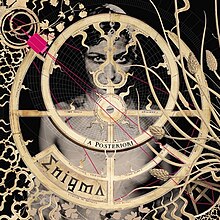A posteriori (album)
| A Posteriori | ||||
|---|---|---|---|---|
 |
||||
| Studio album by Enigma | ||||
| Released | September 22, 2006 | |||
| Recorded | 2005–2006 at various places with the "Alchemist" (all in one computed mobile studio) |
|||
| Genre | ||||
| Length | 53:36 | |||
| Label | Virgin / EMI | |||
| Producer | Michael Cretu | |||
| Enigma chronology | ||||
|
||||
A Posteriori is the sixth studio album by German musical project Enigma. It is Enigma's sixth album. In December 2006, the album was nominated in the Best New Age Album category in the 2007 Grammy Awards.
While the previous album, Voyageur, contained minimal amounts of the project's signature sounds, A posteriori only contains the signature "Enigma horn" (a foghorn) during the opening minute of the album, and even then it is a fleeting glimpse. Coupled with the album's subject matter of the collision of the Milky Way and Andromeda galaxies, A posteriori is, compared to earlier releases, stark and foreboding.
News about the album's title and track list were first made public on 18 July 2006 through Crocodile-Music.de news page and EnigmaMusic.com's forums, while the album cover was made public ten days later. The first track from the album to be made public was "Hello and Welcome," released as a stand-alone single in 2006. Enigma's management subsequently stated that a new version would be included on the album, while the lead single off the album proper would be "Goodbye Milky Way".
A posteriori became first Enigma album to be recorded using Cretu's new 5.1 fully computerized mobile music studio "Alchemist". "Alchemist" represents a machine of comparably small size with main keyboard and a number of hardware MIDI controllers with some "special" expansions and central computer with LCD screen. It was designed for Michael Cretu privately and according to him helped a lot producing music, transferring ideas into sound.
"A posteriori", a Latin phrase translated as "after the fact", refers to empirical knowledge, the epistemological concept of deriving knowledge from past experience.
...
Wikipedia
